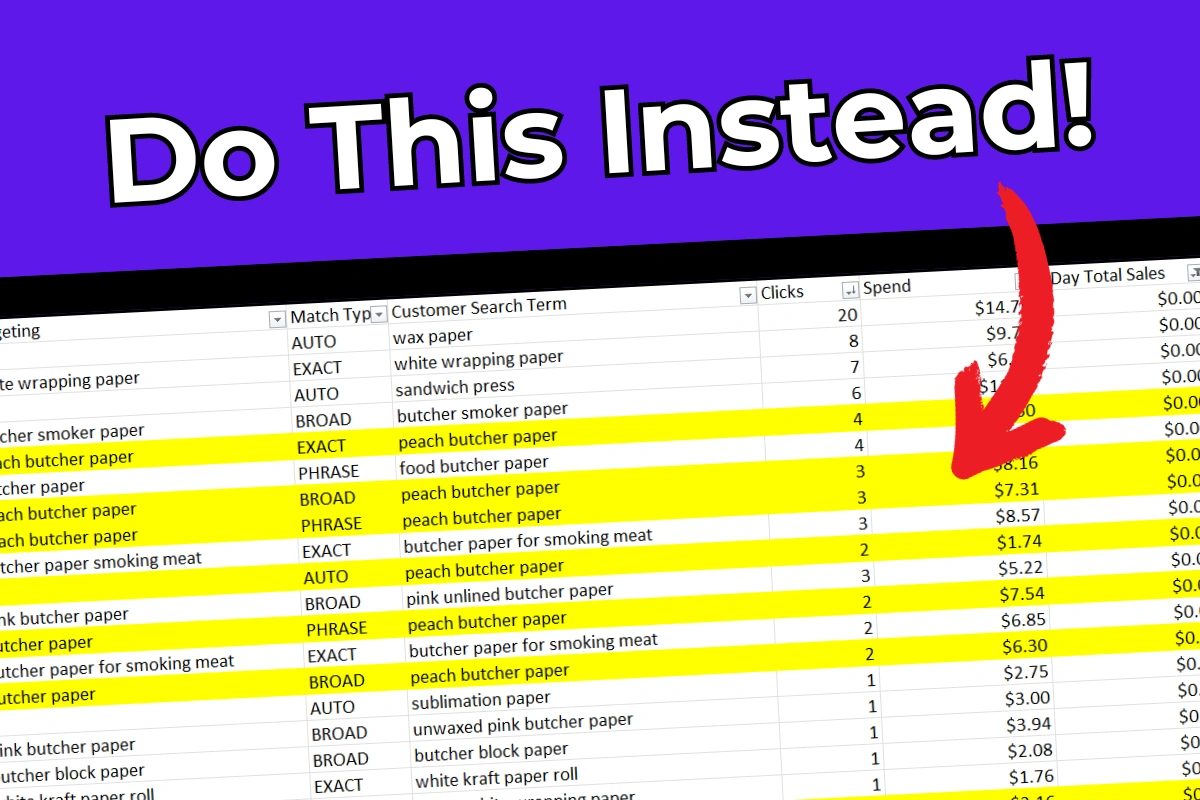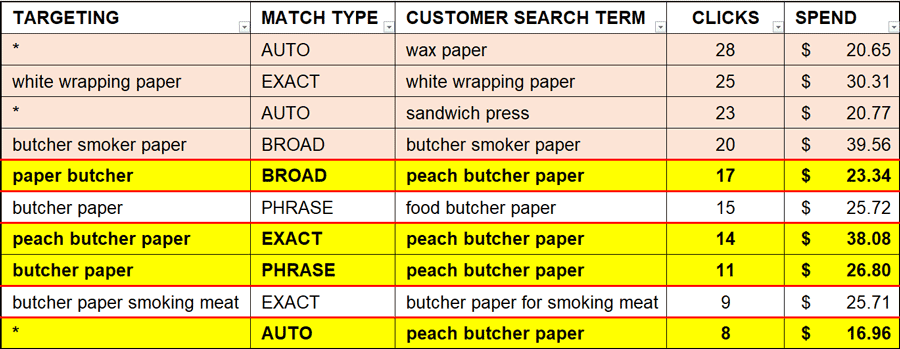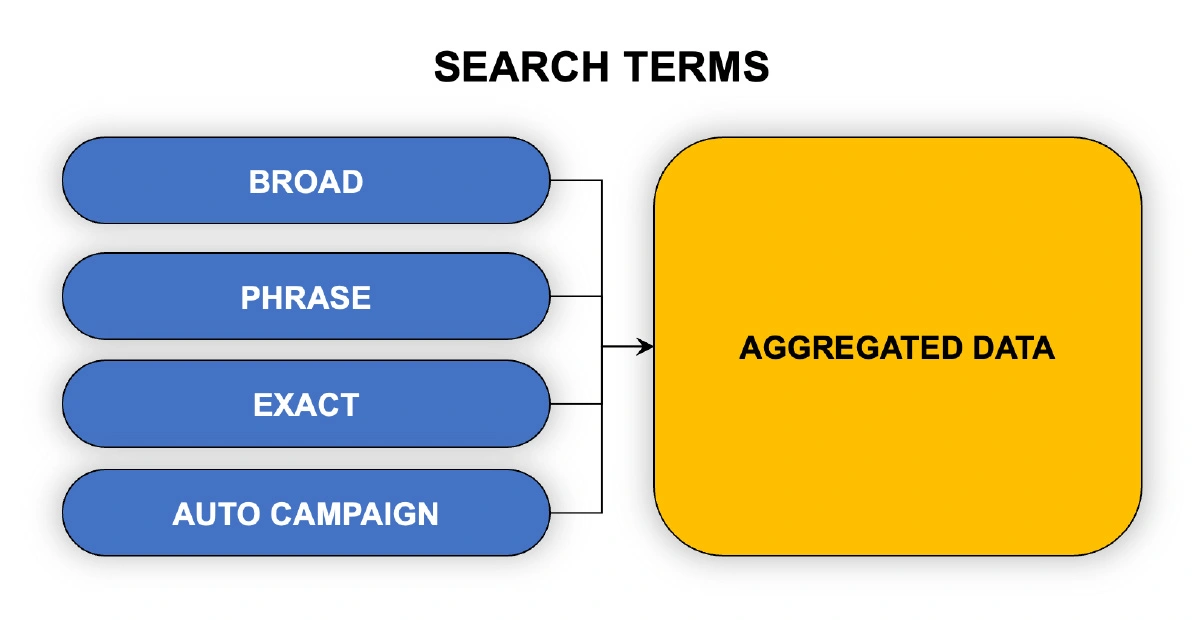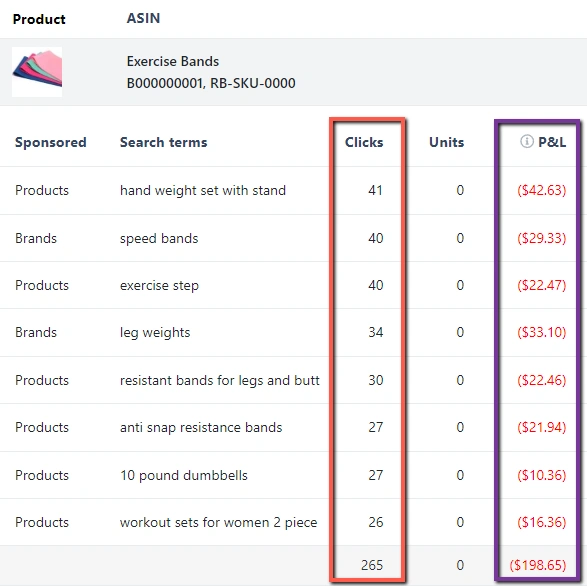After advising aggregators, advertising agencies, and 8-figure Amazon sellers over the past few years, we found that many sellers fall into a common trap without realizing it.
Before we unveil the little-known approach to sprint ahead of your competition, let's address some of the sellers' most common mistakes.
4 Common Mistakes That Even Veteran Sellers Make
Picture this:
- You download the latest Search Term Report.
- You find search terms with high clicks and $0 sales.
- You add negative keywords to the ad that trigger those search terms.
Seems like a solid plan, right?
Well, here's the catch - you may be missing out on silently bleeding search terms that flew under your radar.
The result? Misinformed decisions that chip away at your profit margin.
Let's break it down with an example.
The table below shows filtered terms with $0 sales.
The top 4 rows are search terms with >= 20 clicks you want to negate.
The bottom rows are search terms you ignore due to "insufficient data."
If you take a closer look at the highlighted rows, you'll notice "peach butcher paper" appears multiple times, triggered by different keywords, match types (broad, phrase, exact), and campaign types (auto, manual).
In total, "peach butcher paper" got 50 clicks, $105.18 spend, and $0 sales.
Stop Making These Leaky Mistakes
What if you only negate individual search terms, in this case, with at least 20 clicks? - That's mistake #1.
You would have missed out on search terms with high accumulated clicks and ad spend because they're scattered across different keywords.
To make matters worse, this is only from one search term alone.
And are you only negating it at the ad that triggers it, not other places that can potentially trigger it? - That's mistake #2.
Imagine thousands of leaky search terms hiding in plain sight, faithfully siphoning profits from you every single day like clockwork.
How many Lamborghinis would you have gifted away over the next few years?
So How To Tackle This Problem?
The answer lies in a process called Search Term Aggregation.
This method combines unique search terms from various keywords, match types, and campaign types into a single, unified performance dataset.
This unified data gives you better insights into the holistic performance of each unique search term, enabling you to optimize faster with more data.
Taking It To The Next Level By Factoring Profit-Centric Metrics
Are you infusing your product's profit margin, conversion, and competition into the negation process?
We have seen products with a $60 selling price and $0.10 per click (non-branded search).
We have also seen products with a $20 selling price and $6.00 per click.
Are you applying the same set of negation logic across different products, like 99% of your competition, out of convenience? - That's mistake #3.
Or are you customizing your negation strategy granularly based on your product, squeezing every droplet of your advertising budget like the pros?
This is where Scale Insights can help.
Besides aggregating search terms from multiple sources, it also computes their break-even bid and P&L based on your product's COGS and FBA fees.
These aggregated profit-centric metrics help you to uncover bleeding search terms in seconds, so that you can quickly cut your loss by eliminating them from multiple sources.
Search Term Aggregation in Scale Insights
Scaling Your Negation Strategy with Automation
While adding negative keywords helps reduce your ACOS/TACOS, manually doing the same repetitive process every few days is sooooo not fun.
10x more excruciating if you were to factor in your product's margin, conversion, and average CPC.
Why deal with these mind-numbing stuff manually if they can be automated perfectly, allowing you to focus on higher leveraged activities?
Such as upgrading your negation strategy to add more optimization opportunities:
- Preemptively negating irrelevant search terms before the first click.
- Profiting from unprofitable search terms with sales but with high ACOS.
- And more...
Interested?
Check out what Scale Insights can do for you.
P.S. Negating exact match keywords? That's mistake #4.
There's a better way to do it with multiple strategies, which we'll leave for another blog post for another day.
Or if you're curious, we cover those strategies in Scale Insights (Heh! Just go check it out already!)





